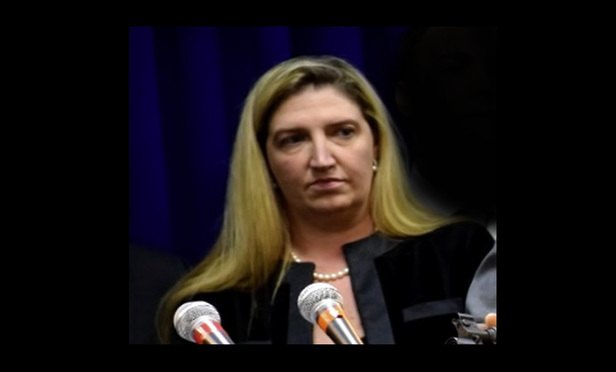 Tara Lenich, who admitted to forging judicial orders to run illegal wiretaps on a fellow prosecutor and a New York City police detective, was sentenced to one year in prison early in 2018.
Tara Lenich, who admitted to forging judicial orders to run illegal wiretaps on a fellow prosecutor and a New York City police detective, was sentenced to one year in prison early in 2018.Federal Lawsuit Over Ex-Brooklyn Prosecutor's Wiretapping Clears Hurdle
Substantial portions of the individual suit against New York City and certain individual plaintiffs will proceed in the lawsuit brought by one of the people illegally surveilled by former Brooklyn ADA Tara Lenich, and could signal good tidings for a parallel class action brought by those unintentionally caught up in the wiretaps.
March 04, 2019 at 05:08 PM
4 minute read
A civil lawsuit by the target of now-disbarred former Brooklyn state prosecutor Tara Lenich's illegal wiretapping against government officials will proceed under federal Electronic Communication Privacy Act and Section 1983 municipal liability claims, along with a number of state claims, U.S. District Judge Nicholas Garaufis of the Eastern District of New York ruled.
While Garaufis' ruling is a clear win in the individual suit by former assistant DA Stephanie Rosenfeld, attorneys involved in both Rosenfeld's action and a parallel class action brought by those illegally surveilled by Lenich see the ruling as having a broader impact.
“It's a ringing endorsement for the Wiretap Act and the city's liability under it, and it bodes extremely well for the larger case filed in tandem … for the entire class of people who were also wiretapped during that 18-month period by Lenich,” said Emery Celli Brinckerhoff & Abady name attorney Richard Emery, whose firm represents Rosenfeld personally and, alongside Wiggin and Dana, in the separate class action.
Both suits draw from the events that led to details splashed across the front pages of the city's tabloids that called into question the actions of top officials in the Brooklyn DA's office, and culminated in Lenich's guilty plea to two federal felony counts of illegal interception of communications.
From her perch atop the Brooklyn DA's violent criminal enterprise bureau, Lenich spent years wiretapping Rosenfeld and NYPD Det. Jarret Lemieux. According to reports, Lenich's illegal breach of wiretap protocol was driven by her romantic interest in Lemieux, who was married, and whom she believed was having an affair with Rosenfeld.
To get around the protocols in place at the DA's office, Lenich forged state judges' signatures on wiretap orders to surveil a number of cellphones, and later did the same to get access text messages on the two cellphones.
Rosenfeld claims she was forced to leave the DA's office in May 2017, citing the fallout of the scandal's impact on her professional life, as well as the disruption and disturbance of her personal life caused by the media's interest in her. She commenced her personal suit, Rosenfeld v. Lenich, 17-cv-0729, in December 2017.
The connected federal class action suit, Rosenfeld v. Lenich, 18-cv-06720, commenced in November 2018. The plaintiffs, on behalf of an estimated 700 class members, make three claims under the Wiretap Act—one set against Lenich in her personal capacity, another against her supervisors, and a third against the city. The class action notes that federal law provides statutory relief of “at least” $10,000 to individuals illegally wiretapped.
In his March 1 order in the individual suit, Garaufis found Rosenfeld reasonably pleaded a number of federal claims against the city. On her ECPA claims, the district court agreed that the doctrine of respondeat superior applied to the city.
Most notably, the city should have reasonably anticipated based on the pleadings, according to the order. Considering the steps taken to authorize the wiretaps that are specifically meant to safeguard against the abuse, as well as Lenich's position of authority, Garaufis found that it remained possible the scheme could or should have been foreseeable by superiors in the Brooklyn DA's office.
And while the district court agreed to dismiss the individual ECPA claims against DA Eric Gonzalez and a number of Lenich's supervisors in the office, Rosenfeld's state claims for negligent supervision, general negligence, and tortious interference were allowed to proceed against those individual defendants.
A Brooklyn DA's office spokesman referred a request for comment to the New York City Law Department, whose spokesman did not offer an immediate response.
Related:
Lax Oversight Enabled Illegal Wiretaps by Ex-Brooklyn Prosecutor, Lawyers Say in Proposed Class Suit
Ex-Brooklyn Prosecutor Convicted of Illegal Wiretaps Sentenced to Prison Time
Ex-Brooklyn Prosecutor Convicted of Illegal Surveillance Gets Disbarred
This content has been archived. It is available through our partners, LexisNexis® and Bloomberg Law.
To view this content, please continue to their sites.
Not a Lexis Subscriber?
Subscribe Now
Not a Bloomberg Law Subscriber?
Subscribe Now
NOT FOR REPRINT
© 2025 ALM Global, LLC, All Rights Reserved. Request academic re-use from www.copyright.com. All other uses, submit a request to [email protected]. For more information visit Asset & Logo Licensing.
You Might Like
View All
New York-Based Skadden Team Joins White & Case Group in Mexico City for Citigroup Demerger

Bankruptcy Judge Clears Path for Recovery in High-Profile Crypto Failure
3 minute read
US Judge Dismisses Lawsuit Brought Under NYC Gender Violence Law, Ruling Claims Barred Under State Measure
Trending Stories
- 1We the People?
- 2New York-Based Skadden Team Joins White & Case Group in Mexico City for Citigroup Demerger
- 3No Two Wildfires Alike: Lawyers Take Different Legal Strategies in California
- 4Poop-Themed Dog Toy OK as Parody, but Still Tarnished Jack Daniel’s Brand, Court Says
- 5Meet the New President of NY's Association of Trial Court Jurists
Who Got The Work
J. Brugh Lower of Gibbons has entered an appearance for industrial equipment supplier Devco Corporation in a pending trademark infringement lawsuit. The suit, accusing the defendant of selling knock-off Graco products, was filed Dec. 18 in New Jersey District Court by Rivkin Radler on behalf of Graco Inc. and Graco Minnesota. The case, assigned to U.S. District Judge Zahid N. Quraishi, is 3:24-cv-11294, Graco Inc. et al v. Devco Corporation.
Who Got The Work
Rebecca Maller-Stein and Kent A. Yalowitz of Arnold & Porter Kaye Scholer have entered their appearances for Hanaco Venture Capital and its executives, Lior Prosor and David Frankel, in a pending securities lawsuit. The action, filed on Dec. 24 in New York Southern District Court by Zell, Aron & Co. on behalf of Goldeneye Advisors, accuses the defendants of negligently and fraudulently managing the plaintiff's $1 million investment. The case, assigned to U.S. District Judge Vernon S. Broderick, is 1:24-cv-09918, Goldeneye Advisors, LLC v. Hanaco Venture Capital, Ltd. et al.
Who Got The Work
Attorneys from A&O Shearman has stepped in as defense counsel for Toronto-Dominion Bank and other defendants in a pending securities class action. The suit, filed Dec. 11 in New York Southern District Court by Bleichmar Fonti & Auld, accuses the defendants of concealing the bank's 'pervasive' deficiencies in regards to its compliance with the Bank Secrecy Act and the quality of its anti-money laundering controls. The case, assigned to U.S. District Judge Arun Subramanian, is 1:24-cv-09445, Gonzalez v. The Toronto-Dominion Bank et al.
Who Got The Work
Crown Castle International, a Pennsylvania company providing shared communications infrastructure, has turned to Luke D. Wolf of Gordon Rees Scully Mansukhani to fend off a pending breach-of-contract lawsuit. The court action, filed Nov. 25 in Michigan Eastern District Court by Hooper Hathaway PC on behalf of The Town Residences LLC, accuses Crown Castle of failing to transfer approximately $30,000 in utility payments from T-Mobile in breach of a roof-top lease and assignment agreement. The case, assigned to U.S. District Judge Susan K. Declercq, is 2:24-cv-13131, The Town Residences LLC v. T-Mobile US, Inc. et al.
Who Got The Work
Wilfred P. Coronato and Daniel M. Schwartz of McCarter & English have stepped in as defense counsel to Electrolux Home Products Inc. in a pending product liability lawsuit. The court action, filed Nov. 26 in New York Eastern District Court by Poulos Lopiccolo PC and Nagel Rice LLP on behalf of David Stern, alleges that the defendant's refrigerators’ drawers and shelving repeatedly break and fall apart within months after purchase. The case, assigned to U.S. District Judge Joan M. Azrack, is 2:24-cv-08204, Stern v. Electrolux Home Products, Inc.
Featured Firms
Law Offices of Gary Martin Hays & Associates, P.C.
(470) 294-1674
Law Offices of Mark E. Salomone
(857) 444-6468
Smith & Hassler
(713) 739-1250







